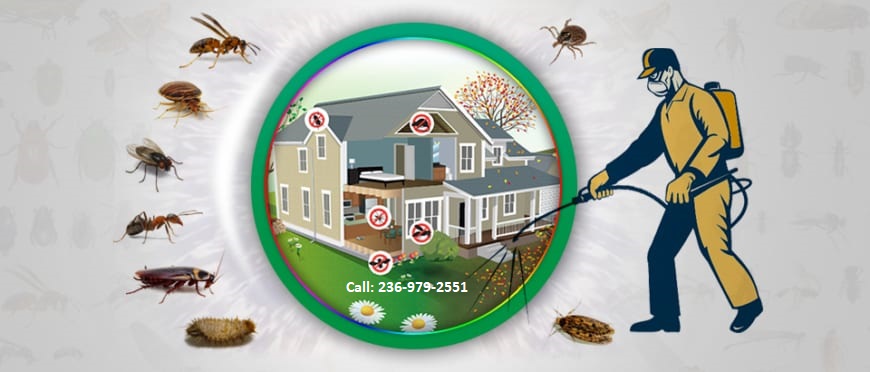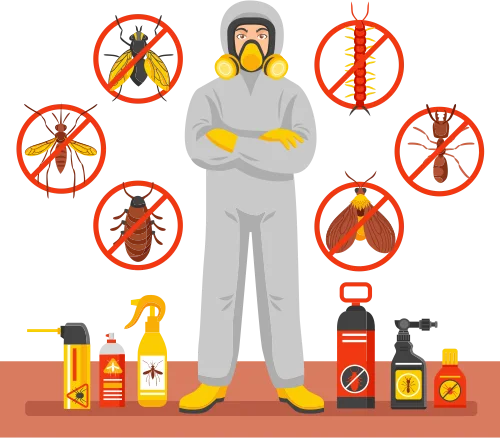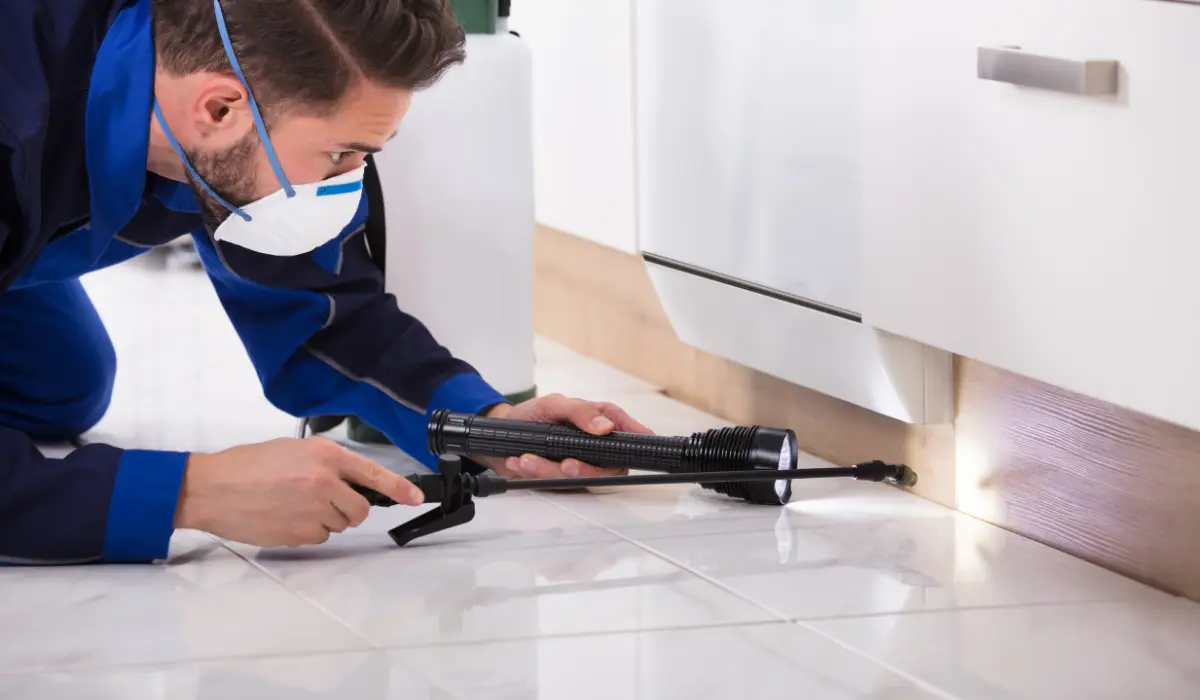Safe and Trustworthy Parasite Control for Lasting Protection
Efficient insect administration needs a multifaceted method that balances eco-friendly integrity with the need for reliable pest reductions. The nuances of these approaches may not be promptly clear, prompting a closer evaluation of the techniques that can lead to lasting bug control results.
Understanding Pest Control Approaches
Pest control incorporates a variety of methods aimed at managing and removing unwanted pests and rats that can endanger both health and wellness and residential or commercial property. Comprehending these techniques is vital for reliable parasite management.
The key classifications of pest control approaches include mechanical, organic, and chemical methods. Mechanical methods include physical barriers and catches to stop parasite entrance and capture undesirable types. Using screens on windows or employing sticky catches can dramatically reduce bug populaces without introducing dangerous substances - exterminator coquitlam.

Chemical parasite control is commonly the most recognized approach, utilizing chemicals to eliminate parasites. These chemicals can be efficient yet should be used with caution to prevent damaging results on non-target species and the atmosphere.
Benefits of Eco-Friendly Solutions
Exactly how can eco-friendly services transform insect control techniques? The fostering of environment-friendly parasite control techniques offers many advantages, considerably boosting the effectiveness and safety of pest management (exterminator coquitlam). These options make use of all-natural ingredients, decreasing the reliance on harmful chemicals that can pose dangers to human health and wellness and the atmosphere. This shift not only secures families and animals but also reduces the capacity for soil and water contamination.

One more advantage is the favorable effect on local biodiversity. Environment-friendly solutions are designed to target certain pests while protecting beneficial bugs and wildlife, advertising a well balanced ecosystem. This method lines up with the growing customer demand for sustainable techniques, enhancing the credibility of parasite control suppliers.
Integrated Insect Monitoring Methods
The implementation of environment-friendly solutions normally leads to the adoption of Integrated Parasite Administration (IPM) approaches, which even more boost insect control efficiency. IPM is a holistic method that incorporates multiple techniques to take care of insect populaces while decreasing environmental effect. This approach emphasizes making use of organic, social, mechanical, and chemical controls, guaranteeing a well balanced and lasting technique of pest management.
One essential facet of IPM is the extensive analysis of pest task and ecological conditions. By keeping an eye on parasite populaces and identifying their life cycles, specialists can carry out targeted treatments that interfere with the pest's habitat or lifecycle, reducing reliance on chemical pesticides. Additionally, cultural methods such as crop rotation and habitat control can significantly diminish parasite facility and reproduction.
Another vital part is making use of organic control agents, such as advantageous bugs or bacteria, which can normally reduce insect populations. When chemical applications are required, IPM prioritizes the use of low-risk chemicals and uses them selectively, decreasing exposure to non-target organisms and humans.
Incorporating IPM strategies not just boosts bug control efficiency but also advertises a more secure environment, lining up with the growing need for lasting methods in pest monitoring.
Safe Practices for Home Owners
Comprehending the significance of safe techniques in insect control can empower property owners to properly handle pest concerns while securing their health and the setting. Carrying out preventative steps and safe techniques is essential in reducing exposure to harmful chemicals.
Home owners should first analyze their environment for conditions that bring in parasites, such as standing mess, food, and water waste. Consistently cleaning and sealing entrance factors can hinder pests from getting into the home. Using all-natural deterrents, such as essential oils or diatomaceous earth, can supply reliable choices to chemical pesticides.
When chemical treatments are required, house owners must go with items that are specifically labeled as safe for domestic use. It is necessary to adhere to application guidelines meticulously to avoid overexposure. Utilizing targeted therapies in areas where bugs are determined, rather than covering spraying, can dramatically decrease chemical usage.
Lastly, preserving open communication with parasite control specialists is essential. House owners need to make inquiries about the safety of items utilized and request eco-friendly alternatives whenever possible. By taking on these safe practices, home owners can produce a healthier living environment while successfully managing parasite problems.

Tips for Long-Term Security
Developing a bug management strategy that stresses long-lasting protection can substantially improve the performance of the risk-free practices previously talked about. To accomplish this, home owners must apply routine examinations of their building, focusing on concealed areas such as attic rooms, basements, and crawl spaces. Early discovery of pest task is critical in avoiding problems from taking hold.
Furthermore, keeping a tidy environment is crucial. This consists of proper food storage, quickly cleansing spills, and consistently throwing away rubbish. These techniques decrease attractants that attract parasites into the home. Moreover, securing entry points, such as splits around doors and windows, can successfully obstruct possible pest gain access to.
Landscaping must additionally be taken into consideration; maintaining plants cut and maintaining a distance fumigation between greenery and the home reduces concealing places for pests. Using all-natural deterrents, such as vital oils or diatomaceous planet, can additionally inhibit problems without considering severe chemicals.
Finally, working together with a specialist insect control solution for regular examinations fly control can provide an added layer of safety. These experts can supply tailored recommendations and progressed therapies, guaranteeing that your home stays secured versus parasites in the long-term.
Verdict
To conclude, reputable and risk-free pest control calls for a complex technique that emphasizes green techniques and incorporated pest monitoring. By carrying out natural deterrents, performing normal inspections, and keeping appropriate sanitation, homeowner can substantially reduce bug populations while Discover More Here protecting valuable bugs and the atmosphere. Cooperation with expert pest control solutions enhances the effectiveness of these strategies, making sure customized services that give enduring defense and satisfaction versus future infestations.
Reliable pest administration calls for a multifaceted strategy that balances environmental honesty with the need for efficient parasite suppression. The adoption of environment-friendly pest control methods uses various advantages, dramatically boosting the effectiveness and security of parasite management.The application of environment-friendly remedies naturally leads to the adoption of Integrated Bug Monitoring (IPM) strategies, which better improve parasite control efficiency. exterminator coquitlam. By keeping an eye on bug populaces and identifying their life cycles, practitioners can execute targeted interventions that disrupt the pest's habitat or lifecycle, decreasing reliance on chemical pesticides.In final thought, dependable and risk-free bug control needs a diverse technique that highlights environment-friendly methods and incorporated bug administration